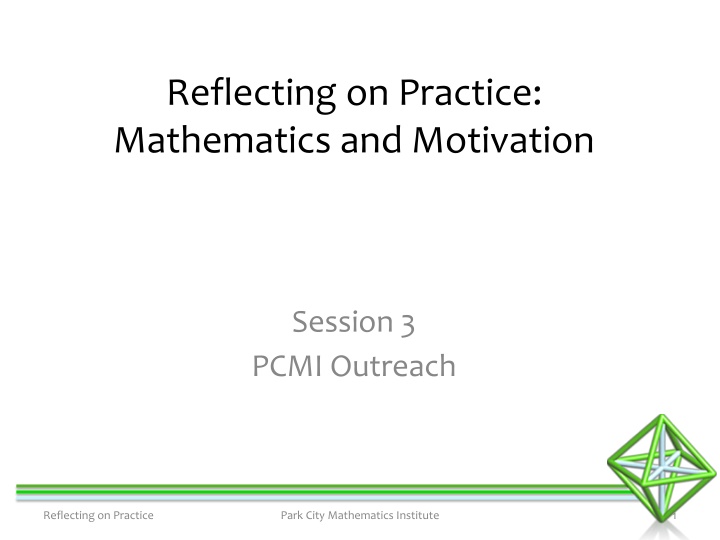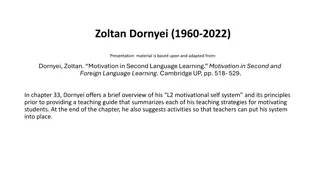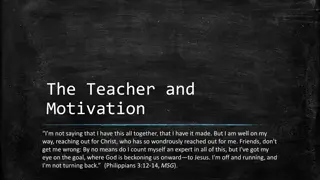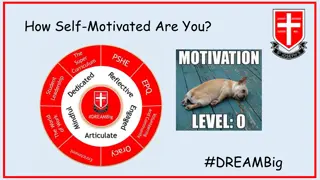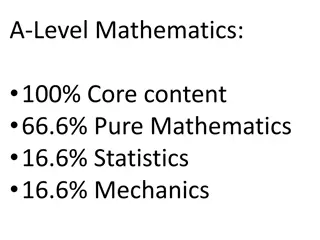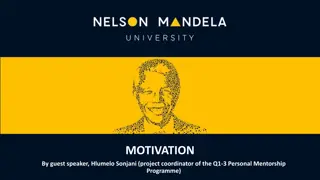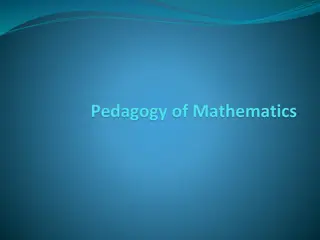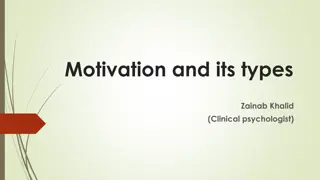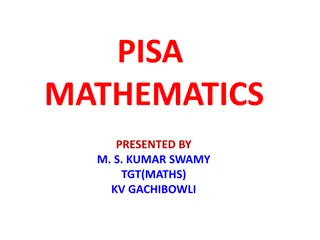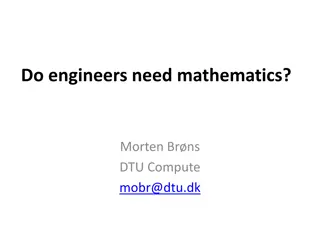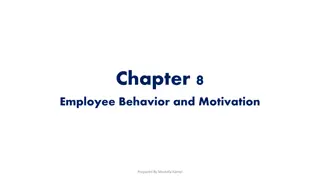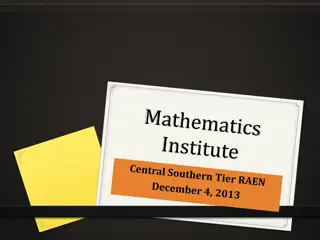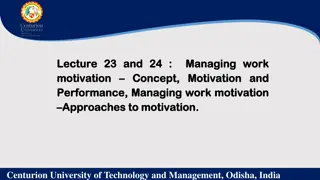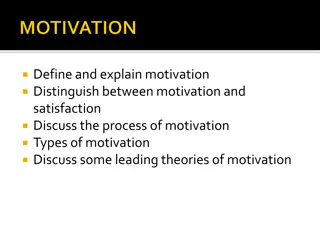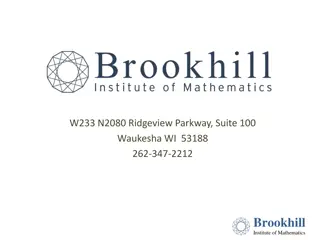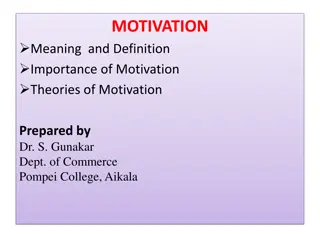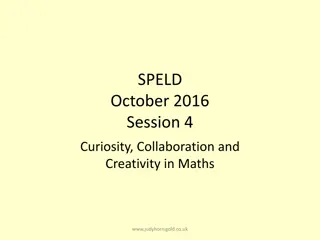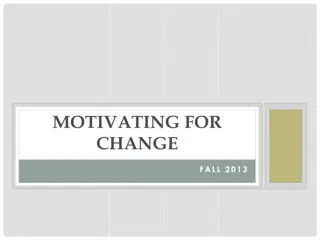Enhancing Student Motivation in Mathematics: Strategies and Reflections
Explore ways to foster motivation in mathematics education through meaningful engagement, belongingness, and accountability. Discover how norms of participation and structured debates can enhance learning experiences for students. Reflect on practices to improve student motivation and engagement in mathematics classrooms.
Download Presentation

Please find below an Image/Link to download the presentation.
The content on the website is provided AS IS for your information and personal use only. It may not be sold, licensed, or shared on other websites without obtaining consent from the author.If you encounter any issues during the download, it is possible that the publisher has removed the file from their server.
You are allowed to download the files provided on this website for personal or commercial use, subject to the condition that they are used lawfully. All files are the property of their respective owners.
The content on the website is provided AS IS for your information and personal use only. It may not be sold, licensed, or shared on other websites without obtaining consent from the author.
E N D
Presentation Transcript
Reflecting on Practice: Mathematics and Motivation Session 3 PCMI Outreach Reflecting on Practice Park City Mathematics Institute 1
Welcome Back! Take a few minutes to introduce yourselves at your table- not only your name and where and what you teach but also- What s your favorite math movie? OR What are you doing while you re grading papers? Reflecting on Practice Park City Mathematics Institute 2
RoP: Student Motivation Teachers will leave with a framework for thinking about motivation & strategies to help students want to engage with mathematics. Specifically, we will focus on: Meaningfulness Belongingness Accountability Reflecting on Practice Park City Mathematics Institute 3
Accountability Accountability refers to the structures and routines that oblige students to report, explain, or justify their activities. Often reduced simply to assessment, accountability goes beyond how we grade to encompass the routines and norms that enjoin students to participate in particular ways in classroom life. When students feel a sense of investment in and accountability to their classmates, for example, this changes the risk-benefit calculus, leveraging positive peer pressure to increase participation. (Horn, p. 8) Reflecting on Practice Park City Mathematics Institute 5
Norms of Participation are about the expectations students and teachers have for the way class works: 1) everyone participates, 2) listening matters, and, 3) the focus is on mathematical ideas. Reflecting on Practice Park City Mathematics Institute 6
A Debate The question is: Whose solution is the best and why? To prepare for your table's debate, spend a few minutes making observations about something you like about each solution e.g. I like that they made a table . Reflecting on Practice Park City Mathematics Institute 7
Debate Structure At your tables, debate using the following structure: Make a CLAIM and a WARRANT to support your claim My CLAIM is __________, and my WARRANT is ____________, Reflecting on Practice Park City Mathematics Institute 8
Chris Luzniak (PCMI '10 & '11) Reflecting on Practice Park City Mathematics Institute 9
Chris Luzniak (PCMI '10 & '11) PBS Video https://utah.pbslearningmedia.org/resource/mtc13.pd.math.de b/encouraging-debate#.W0aB69JKhPY Reflecting on Practice Park City Mathematics Institute 10
Take a few minutes with your table group and talk about how this routine could encourage participation in your classroom. Reflecting on Practice Park City Mathematics Institute 12
Solve the system x + y = 10, y = x + 2 Reflecting on Practice Park City Mathematics Institute 13
Solve the system x + y = 10, y = x + 2 x+ y = 20, y = x + 2 Reflecting on Practice Park City Mathematics Institute 14
Solve the system x + y = 10, y = x + 2 x + y = 20, y = x + 2 x + y = 20.5, y = x + 2 Reflecting on Practice Park City Mathematics Institute 15
Take a few minutes with your table group and talk about how this routine encourages participation in your classroom. Reflecting on Practice Park City Mathematics Institute 16
Smudged Math Can this equation be true? Reflecting on Practice Park City Mathematics Institute 17
Norms of Participation are about the expectations students and teachers have for the way class works: 1) everyone participates, 2) listening matters, and, 3) the focus is on mathematical ideas. Reflecting on Practice Park City Mathematics Institute 18
On your own Choose one or two of the problems on the handout. Solve it/them. If you have time remaining, think about an extension or how you might adapt these for your classroom Reflecting on Practice Park City Mathematics Institute 19
On the board Head to VNPSs! Share with your card-mates your solutions and/or extensions. Be sure to be actively listening, as you'll be bringing this discussion back to your table. You'll be sharing one of the solutions/extensions you heard with a table partner in a few minutes Reflecting on Practice Park City Mathematics Institute 20
Back to the tables With a partner, back at your table, share at least one interesting thing someone else at your board presented Reflecting on Practice Park City Mathematics Institute 21
Smudged Math Debrief How does having students use this routine of smudged math and/or active listening relate to accountability? Norms of Participation: - everyone participates, - everyone has to listen to how others thought about the problem, and - the focus is on important mathematical ideas. Reflecting on Practice Park City Mathematics Institute 22
Reflection Question What are the gaps between what you say you value and what students do? What structures or routines can you incorporate that might help you teach your students new ways of being in math class? Reflecting on Practice Park City Mathematics Institute 23
One Goal In respect to what we have learned today, write down one goal that you have as an enhancement to your teaching practice. What are some ways that you can begin to implement your goal? Share your ideas with a partner or at your table. Reflecting on Practice Park City Mathematics Institute 24
References Encouraging Debate. PBS Learning Media. https://ca.pbslearningmedia.org/resource/mtc13.pd .math.deb/encouraging-debate/#.W0aB69JKhPY Horn, L. (2017). Motivated. Portsmouth RI: Heinemann Luzniak, C. (2015). Debate Resources. https://www.luzniak.com/debate-resources.html Smudged Math https://twitter.com/hashtag/smudgedmath Reflecting on Practice Park City Mathematics Institute 26
